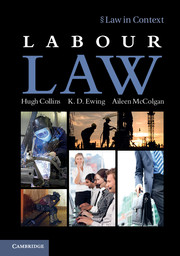Book contents
- Frontmatter
- Contents
- Preface
- Acknowledgments
- Table of cases
- Table of statutes
- Table of statutory instruments
- Table of European Union instruments
- Table of ILO instruments
- Table of other international instruments
- Abbreviations
- Part I Introduction
- Part II The contract of employment
- 3 Terms of the contract of employment
- 4 Authority and co-operation
- 5 Flexibility and precarious work
- 6 The personal scope of labour law
- Part III Statutory regulation of the employment relationship
- Part IV Collective labour rights
- Part V Termination of employment
- Index
- References
5 - Flexibility and precarious work
from Part II - The contract of employment
- Frontmatter
- Contents
- Preface
- Acknowledgments
- Table of cases
- Table of statutes
- Table of statutory instruments
- Table of European Union instruments
- Table of ILO instruments
- Table of other international instruments
- Abbreviations
- Part I Introduction
- Part II The contract of employment
- 3 Terms of the contract of employment
- 4 Authority and co-operation
- 5 Flexibility and precarious work
- 6 The personal scope of labour law
- Part III Statutory regulation of the employment relationship
- Part IV Collective labour rights
- Part V Termination of employment
- Index
- References
Summary
Under the general law of contract, the parties are bound by the terms of their initial agreement. Unless otherwise provided in the terms of the contract, the law assumes that these terms will last indefinitely until the contract is terminated. In general, the constancy and rigidity of the legal rights conferred by the contract of employment protect both employer and employee against opportunism and unfair conduct. The employee can, in principle, reject demands for changes made by the employer and instead can insist upon the agreed pay, hours of work and the type of work laid down in the contract. Equally, the employer can demand the promised work and is able to reject attempts by employees to avoid aspects of the job or to shorten their hours of work. Despite these benefits provided by the common law of contract, this static legal framework fits uncomfortably over the real needs and expectations (or the psychological contract) of both employer and employee for flexibility in the functioning of this contract in the longer term. At the very least, the level of wages is likely to increase in order to keep pace with inflation, but many other changes may become necessary.
To remain profitable and effective, an employer needs to be able to adapt to changing market conditions and new technologies. Innovation in products and services is often the key to long-term success in business, and these developments may require significant alterations in the type of work performed by employees. New methods of work, often using information technology, will often produce essential savings and a more effective service to customers. To maintain and improve efficiency and productivity, an employer therefore usually requires various types of flexibility from its employees. Studies of managerial practice often distinguish between three types of flexibility sought by employers: functional, numerical, and wage flexibility.
- Type
- Chapter
- Information
- Labour Law , pp. 158 - 184Publisher: Cambridge University PressPrint publication year: 2012



